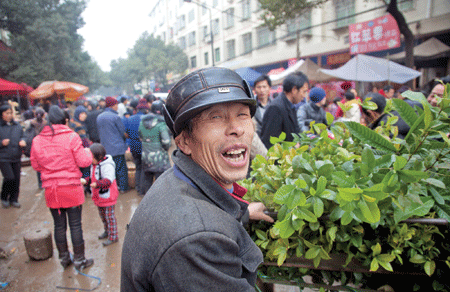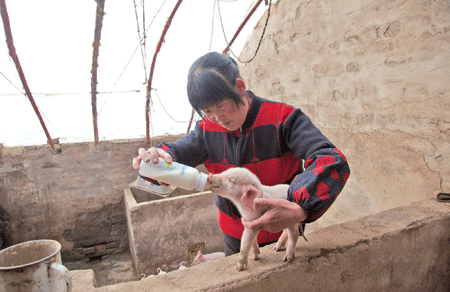'Comparing sky and earth'
Updated: 2012-03-26 08:06
By D J Clark (China Daily)
|
|||||||||||
 |
|
A plant salesman with his cart in Hengyang downtown, Hunan province. [Photos by D J Clark / China Daily] |
 |
|
Raising pigs offers another source of livelihood for farmers in Shimen village, Gansu province. |
Though most of China has experienced blistering growth and improved living standards in the past three decades, pockets of poverty still remain. D J Clark reports in Hunan, Gansu and Qinghai provinces.
As Chinese New Year approached I had driven into the center of the country for the last stage of my trip around rural China.
Up until this point I had been slowly following the coast south, and it was time to head inland into some of China's more remote and poorer provinces.
Official figures estimate there are 230 million migrant workers in China, most of whom try to return to their homes during the Spring Festival travel season. Over 2 billion journeys are made, making it the world's largest human migration. I was following the crowds.
In Hengdong county, Hunan province, the usually quiet villages and towns were beginning to wake up as swarms of migrants returned for their annual family gathering.
I stopped the car in Xinyang village and walked along a narrow concrete road. Liu Changhua invited me into his home.
"The Spring Festival makes me happy because all my sons and daughters come back," he told me as he took a seat on a small wooden stool in a spacious hallway.
Liu's three children left him to seek better lives outside the village. His eldest son, Liu Fenxiang, who's married and has two children, left the village in 1993 to work in Guangdong province.
Leaving his son behind under the grandparents' care, Liu Fenxiang became emotional as he started to justify his move away from the village.
"I go out to work as I must earn money to feed the family. Otherwise it would be very difficult for the family because we only have a little land," Liu said. "When I am working outside I always dream about home."
As the Liu family gathers each year to celebrate the festival, so they also weigh up the benefits of finding new wealth in China's distant cities.
When I asked Liu Fenxiang if he was happy with his life as a migrant worker, he fixed me an empty stare.
"You can't use money to buy happiness. Thirty years ago I thought money can do everything but now I know it can't. Now I think relationships are more important than money."
Leaving Xinyang village I continued inland through Chongqing, Sichuan and into Gansu province.
I was picked up in the provincial capital, Lanzhou, by Huo Mingde, a farmer who had prospered by renting farmland from migrant workers and growing potatoes on a grand scale.
We stopped at Shimen village, sitting between muddy brown mountains, partly frosted by the winter cold. Its remote geography meant many of the rural developments seen in central China had yet to be fully implemented in Shimen - the situation worsened by recent droughts.
Today's Top News
Rescuers race against time for quake victims
Telecom workers restore links
Coal mine blast kills 18 in Jilin
Intl scholarship puts China on the map
More bird flu patients discharged
Gold loses sheen, but still a safe bet
US 'turns blind eye to human rights'
Telecom workers restore links
Hot Topics
Lunar probe , China growth forecasts, Emission rules get tougher, China seen through 'colored lens', International board,
Editor's Picks

|

|

|

|

|

|





